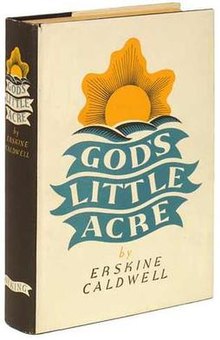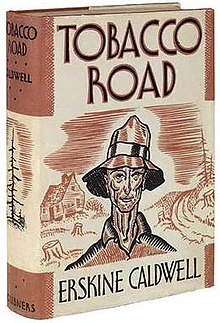
"What
William Faulkner implies, Erskine Caldwell records." -- Chicago Tribune
"Caldwell
writes with a full-blooded gutsy vitality that makes him akin to the truly
great." -- San Francisco Chronicle
At
one time, and maybe even today, God's
Little Acre (1932) was the most popular novel ever published, selling a
reported fourteen million copies. But in
the process, the book ignited a firestorm of controversy, leading to numerous
efforts to suppress it.
A
year earlier, Caldwell's Tobacco Road
was published. It had become a runaway
best-seller after it was adapted as a stage play. When the play ended its long run years later,
it was the longest-running play in Broadway's history. The play spurred book sales and eventually
ten million copies were sold.
Caldwell's
portrayal of poor white southern tenant farmers who had been exploited by their
landlords outraged many southerners and received mixed reviews from
critics. There were also charges that its
explicit sexual scenes constituted obscenity and it was banned from many
libraries, including in his hometown, and efforts were made to suppress it
elsewhere.
That
was only the beginning. God's Little Acre was even more
controversial.
Once
again Caldwell wrote about the dire straits of poor white rural people who when
faced with choices rarely chose the right one.
But it also focuses on southern textile mill hands who are exploited by
their employers. At one plant the
workers strike for higher wages and a shorter work week, but because they are deprived
of union protection the owners lock them out and shut down the mill.
There
is no doubt that Caldwell was influenced by several strikes by southern textile
workers that occurred in the late '20's and early '30's, strikes that were in
response to the fact that they were the lowest paid textile workers in the
nation.
While
Caldwell again presented his story as a curious combination of black humor and
tragedy, a combination that confuses critics -- not to mention readers -- God's Little Acre becomes very serious
-- deadly serious -- when it turned from the humorous efforts of Ty Ty Walden
and his sons to find gold on their farm to an attempt by Ty Ty's son-in-law to
forcibly re-open the textile plant that has kept him and his co-workers
unemployed for a year and a half.
The
sexual scenes in God's Little Acre are even more explicit than in Tobacco
Road. And while they are relatively
mild by today's standards, they were not mild by the standards of that day.
In
1933, Caldwell and his publisher, Viking Press, were hauled into court on a
charge of disseminating pornography. It
was reported that more than sixty writers, editors, and literary critics
rallied to his support. Caldwell's
defense was that if his book was obscene it was because the truth was
obscene. The judge ruled in his favor,
declaring that the book was literature and not pornography. However, that did not deter other efforts to
suppress the book. But what would-be
book banners never seem to learn is that all that publicity spurs sales and the
novel became not only Caldwell's biggest seller, but one of the biggest ever.
The
book was still very controversial many, many years later and that is why I
tucked my copy inside my lit book during my sophomore year in high school. I knew that it was going to be a lot more
interesting than my assigned reading.
Well, I must confess that it wasn't just the controversy. It was also the lurid cover featuring a
scantily-clad, well-endowed young lady on the cover of the paperback re-issue
that I possessed. But that's another
story.
You
probably already know the meaning of the book's title by now, but if not, I
don't wish to be a spoiler. I'll let the
publisher's blurb describing the book do that.


